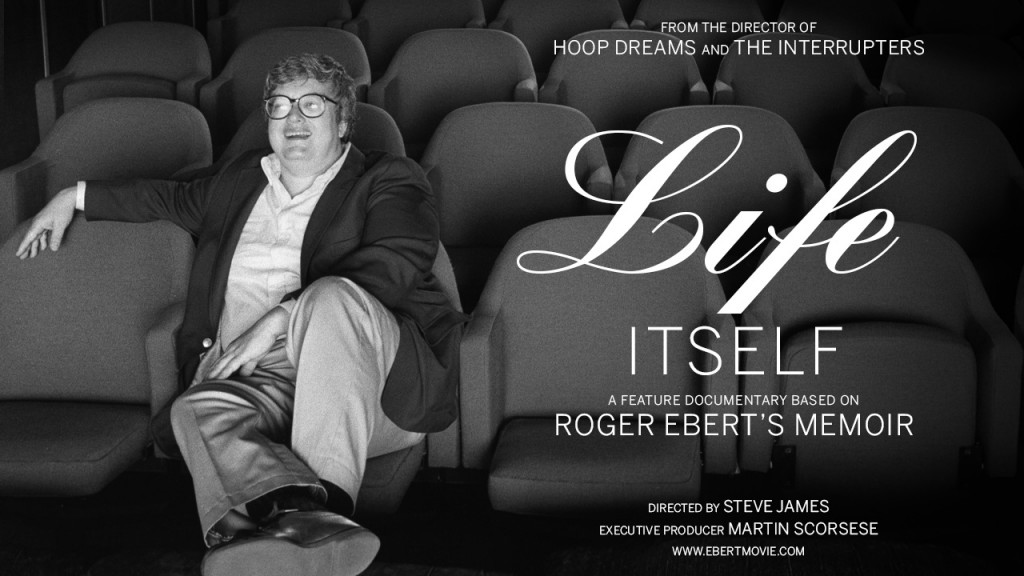
Life Itself ****1/2
Often, a movie, particularly a documentary, sends me to the book upon which the film is based.
And usually, almost always, I find the written work better than the film version.
In fact, I don’t think I can name more than a handful of films that I found superior to the written ‘version.’
The current documentary, Life Itself, about the life and ultimately the death of Pulitzer Prize (1975) winning film critic (Chicago Sun-Times) Roger Ebert, is one of the instances in which I’d choose the film over the memoir.
The memoir is good, particularly the latter part. It is well written, honest, and informative.
The documentary is excellent, bringing to life what is in the memoir (similar title) but allowing the viewer to almost participate in the life and death of Ebert.
Directed by Steve James (Hoop Dreams) and featuring Ebert, his wife Chaz, and Gene Siskel, Life Itself is a mixture of a profile of Ebert, of a love story of Roger and Chaz, of the relationship (love-hate?) of Ebert and Siskel, and most of all, an inside view of a man who chooses ‘to go gentle into that goodnight.’
For me, it is particularly this end of life story that I found so moving.
 Briefly, because of cancer and three failed surgeries, Ebert loses his ability to eat, to drink, to speak, and thus to continue his TV reviews of film, all things he loved. Additionally, he became disfigured by the loss of his jaw and became physically disabled too.
Briefly, because of cancer and three failed surgeries, Ebert loses his ability to eat, to drink, to speak, and thus to continue his TV reviews of film, all things he loved. Additionally, he became disfigured by the loss of his jaw and became physically disabled too.
Yet Ebert refused to be humbled or curtailed by his misfortunes. He learned to blog and continued to use a computer to communicate. Most of all, he was able to be involved in life until the very end of his life.
Steve James, who began filming Ebert just five months before his death, captures all of this, especially Ebert’s courage and Chaz’s fierce loyalty to him.
Ultimately, it is the very personal, and heroic, story of how a man and his wife choose to deal with what would likely crush most of us.


janet brownsister said:
it sounds like a :must see”
not yet in Atlanta
Did it make you think of our dad or your own life?
if you answer “yes”, you have turned into Sammy!
Diane Kupelian said:
How fitting that Roger Ebert’s documentary is superior to the book– he’s a great writer, but his true love has always been the medium of film. Sometimes, the medium is essential to the message!
Sounds like a movie I will want to catch. Thanks for the heads up!
Richard said:
Diane,
You captured exactly what I was trying to write: in this case the picture was better than the words, particularly the picture of Ebert’s smiling face despite the toll the cancer had taken upon it and him. Words can be misleading, tho I think his memoir was honest. Still, I will long remember him smiling at the end of his life, something I couldn’t imagine feeling myself.
Janet,
If you are referring to Dylan Thomas’ poetry about ‘raging against the dying of the light,’ then yes, there is memory for me of Sam at the end of his life and a very different message that he gave, how he handled his own end of life: go gently into that good night.
R
elliott trommald said:
I don’t know Diane or Janet but i think I feel what they are feeling. Certainly Life Itself made me feel my sister’s life and my own as I was feeling Roger’s. And Ebert made me understand the power of a movie and the relationship I seem to have with movies. We do live our lives as a movie. Richard, you write that almost always, you find the book better than the film version. I used to agree. Now I find this less true. Take the Fault in our Stars — I think the movie as good as the book, actually better. The reason for me is that both work on me in a different way. When I read a book I control the action and the color and the emotion. The intellect is engaged; I read; I stop and muse or reread a beautiful line; I consider whether I feel as the author feels or whether the author’s story is believable. I might even critique the book as I read. All of that is enjoyable. In a film, I am sucked into the story for better or worse and feel it, I can’t go back and reconsider what I just saw; I am carried along sometimes against my will. I am bothered, angry, enlightened, exhilarated. (Snowpiercer as film was more troubling for me than the book. After feeling and living the film (in the caboose and the engine room) — then comes the intellectual, rational, critical considerations. For me, its the difference between being in a film and reading a book. Watching a good movie: for a short while my life is taken emotionally where I have not been; its different with a book. One is not necessarily better, just delightfully different. I cry easier as I age, and far more often when involved with a film than with a book. Maybe I should see On Golden Pond again.
Richard said:
ET,
I hadn’t seen your thoughtful comments about movie vs book. (I use to get notification of all Comments but now they are all going into my Spam folder and unless I continuously check the website, I sometimes miss comments).
You give me pause and reason to reflect on my oft-stated preference for the book over the movie. I think you are correct that a movie (a good one) can transport differently than a book as there is not time to ponder, reread, consider, reflect, etc. when engaged in a film. And yes, a film can transport more easily, or perhaps it’s more accurate to say, more quickly.
My desire to know the ‘truth’ – which, of course, I know is a slippery slope – usually leads me to the book after the film. Then I seem to get stuck on how faithful was the film. (I also then get wrapped up in how ‘true’ was the book itself, if it was nonfiction). I’m only coming to understand that the two are very different mediums, each with their own value.
As you know I/we see a lot of movies and so, like you, enjoy being transported. Your explanation of emotional vs intellectual speaks to that. I do enjoy having the emotional entanglements, tho I am sometimes suspicious of being (overly?) manipulated. Probably something to do with my need for control and being more comfortable with the intellectual than the emotional. Books can do that too, especially ‘page turners,’ which I love as escapist reading and sometimes (unfairly?) snarkly dismiss as less worthy than fine literature. But I do enjoy them.
But your main point about one not being better than the other, just “delightfully different” is correct.
My getting stuck on ‘truth,’ accuracy, which is better may now recede a bit.
Tho it is hard to change one’s ways after ingraining/engraining them for so long.
Thanx for the schooling.
R